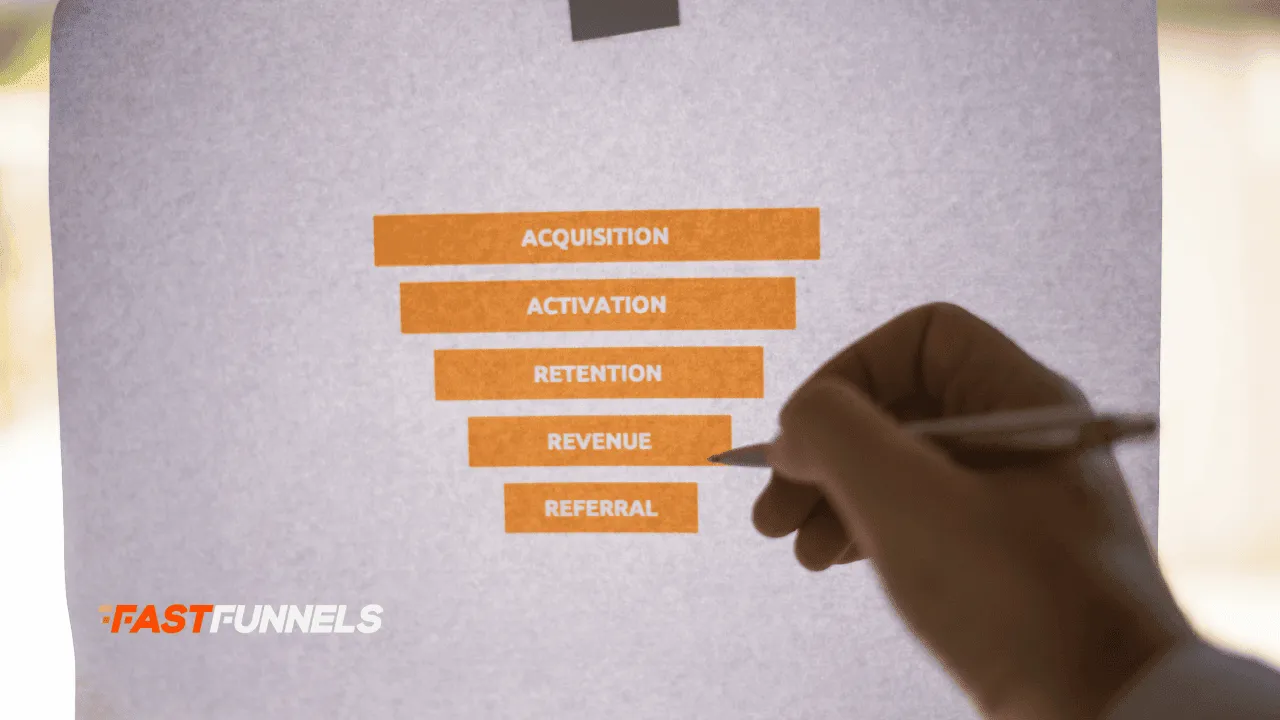In the competitive world of real estate, a well-structured sales funnel can make all the difference. As a real estate agent, mastering the sales funnel process can help you generate leads and convert them into satisfied clients more efficiently. The concept of a sales funnel for real estate revolves around taking potential clients through a step-by-step journey from being prospects to becoming long-lasting customers.
To begin with, it's essential to understand your target audience and accurately identify their specific needs. This allows you to create tailored marketing campaigns that resonate with your potential clients. By providing valuable information and answering frequently asked questions, you establish yourself as a knowledgeable and trustworthy professional in their minds.
Remember, effective communication is a significant part of any successful sales funnel. Engaging with prospects on social media platforms through email campaigns and informative blog posts can create lasting relationships with your audience. Stay confident and clear in your approach, and watch as your real estate sales funnel leads you to greater success in the industry.
Understanding the Sales Funnel for Real Estate
In the world of real estate, achieving success requires a thorough understanding of the sales funnel. Just like any other business, the sales process for real estate involves lead generation, prospect nurturing, and ultimately, closing deals. As a real estate professional, your goal is to guide potential clients through each stage of this process.
First, you need to generate leads for your real estate business. This means attracting potential clients who are interested in buying or selling property. There are several ways to do this, such as running targeted ad campaigns, hosting open house events, and building a strong online presence on platforms like social media and real estate websites.
Next, it's important to nurture these leads by establishing trust and developing rapport with them. This involves regularly staying in touch with prospects, providing them with valuable information about the property market, and addressing any concerns they might have. By doing this, you're also showcasing your knowledge and expertise in the field, positioning yourself as a reliable resource for your clients.
As your leads move through the sales funnel, the most crucial stage comes into play: converting prospects into clients. This requires careful negotiation, perseverance, and the ability to adapt to their needs. You must listen to their concerns and provide solutions that suit their specific situation, be it buying their dream home or selling a property within a certain timeframe or budget.
In summary, understanding the sales funnel for real estate is essential to optimising your approach to converting leads and closing deals. By focusing on effective lead generation, nurturing prospects, and adapting to clients' needs, you'll increase your chances of success in this competitive field. Remember to remain confident, knowledgeable, and clear in your communications to ensure a smooth sales process.
Lead generation strategies
Online Presence Enhancement
To attract prospective buyers and generate leads, it's vital to enhance your online presence. By creating a professional and user-friendly website, you can showcase your real estate listings effectively. Optimise your website for search engines to make it easier for potential clients to find you. Additionally, ensure your contact details are easily accessible, so interested buyers can reach you without hassle.
Effective Use of Landing Pages
Landing pages are essential for capturing leads. Create targeted and customised landing pages for each property you advertise. By having a clear call-to-action and an enticing value proposition, you can encourage visitors to provide their contact information. Also, track and analyse user behaviour on these pages to optimise and improve their performance.
Implementing a Lead Magnet
Offering a lead magnet, such as a free e-book, a neighbourhood guide, or a home valuation service, can be an excellent way to attract potential buyers. By providing valuable content, you encourage visitors to share their details in exchange for the resource you offer. This not only generates new leads but also helps establish trust and authority in your field.
Social Media Prospecting
Leverage the power of social media platforms, such as Facebook, LinkedIn, and Instagram, for prospecting new leads. Share valuable information and property listings and engage with your audience to build relationships. Utilise paid advertising options to target your ideal clients and posts, such as polls, quizzes, and Q&A sessions, to drive engagement.
Organising Open Houses
Organising open houses is a proven method of generating leads in real estate. Plan and schedule regular open houses for your properties, inviting potential buyers to view them firsthand. Ensure you capture visitor contact information during the event for follow-up communications. Additionally, advertise your open houses on social media and industry-specific platforms to draw in more leads.
Converting leads into clients
Initial contact and follow-up
In the real estate business, converting leads into clients is crucial for success. When you initially come into contact with potential clients, it's essential to make a strong first impression and demonstrate your expertise. After establishing a connection, follow-up with them regularly, showcasing your dedication and commitment to providing quality service. By doing so, you are more likely to turn qualified leads into satisfied clients.
Segmentation of leads
Not all leads are created equal, so it's vital to segment them based on specific criteria, such as budget, property preferences, and readiness to purchase or sell. This type of categorization allows you to tailor your approach to each segment, increasing the likelihood of successful conversions. For example, first-time homebuyers might need more guidance and reassurance, whereas experienced investors may require direct information about capital growth and rental yields.
Retargeting Potential Clients
Even after segmenting your leads, not every connection will result in an immediate conversion. This is where retargeting comes in handy. Utilise different techniques, such as email marketing, social media engagement, and personalised content, to maintain communication and remind potential clients of your services. By keeping your brand at the forefront of their minds, it becomes more likely that they'll choose you when the time comes to take action.
Remember, focusing on these strategies can significantly improve your conversion rates and help you build a thriving real estate business. Always strive to understand your clients' needs and provide them with the best possible experience throughout the sales funnel.
Nurturing Client Relationships
Regular Newsletters
To nurture client relationships, it's crucial to keep them engaged and updated with relevant information. One way of achieving this is through regular newsletters. By sending your clients valuable content about the real estate market, you position yourself as a knowledgeable authority in the industry.
Newsletters should be informative and tailored to the specific interests of your clients. They could include insights about market trends, local neighbourhood updates, or property management tips. To maintain a consistent schedule, consider sending newsletters on a monthly or quarterly basis.
Using an email marketing tool can help you manage your mailing list easily and provide you with analytics to refine your strategy. Just ensure you comply with local data privacy regulations.
Smart Property Listing
Another aspect of nurturing client relationships is offering them a personalised property listing experience. A smart property listing allows you to present properties that best match your clients' preferences and needs.
To create a smart property listing, start by gathering key information about each client, such as budget, location preferences, and property type. You could achieve this through an initial consultation or by monitoring their website interactions.
From this data, you can tailor property suggestions to match their unique requirements, saving both you and your clients time and effort. Leverage digital property listing platforms to deliver these curated selections via email or an online portal.
By incorporating regular newsletters and smart property listings into your business strategy, you demonstrate your commitment to providing exceptional service, ultimately nurturing and strengthening client relationships.
Role of Software and Automation
Automation in Email Marketing
In the real estate industry, email marketing plays a crucial role in nurturing leads and converting them into clients. Automation can significantly improve the efficiency of your email marketing campaigns. By setting up automated workflows, you can send targeted messages to leads based on their behaviour or specific milestones.
For instance, when a new lead subscribes to your newsletter, you can automatically send them a welcome email. Following up with personalised content, such as new property listings or relevant market updates, can keep leads engaged and increase the chances of converting them into clients.
Utilising marketing automation software can also help you segment your audience based on their preferences, enabling you to craft tailored messages that are more likely to resonate with them. This, in turn, can lead to better open rates, click-through rates, and ultimately, conversions.
Real Estate Sales Funnel Software
Managing your real estate sales funnel can be a complex task. Adopting dedicated sales funnel software can streamline the process and provide you with the insights needed to optimise your strategies. These tools often come with an array of features designed to make your life easier, such as:
- Lead capture and tracking: Automatically capture contact information from website visitors and track their interactions with your content, helping you identify high-quality leads.
- CRM integration: Sync data between your sales funnel software and your Customer Relationship Management (CRM) platform, enabling seamless communication between all your sales and marketing tools.
- Pipeline management: Monitor each stage of your sales funnel in real-time, allowing you to identify bottlenecks and optimise your strategies accordingly.
- Analytics and reporting: Gain valuable insights into key performance indicators (KPIs), such as lead conversion rates and campaign performance, to help you make data-driven decisions.
In conclusion, leveraging software and automation in your real estate sales funnel can significantly streamline your marketing efforts and help you generate more qualified leads. By automating email marketing campaigns and adopting dedicated sales funnel software, you can reach your audience in a more personalised and targeted manner.
Optimising Marketing Efforts
Understanding the local market
To optimise your marketing efforts in real estate, it's crucial to understand the local market. Research the demographics, property values, and trends in your area. You can utilise local resources, like the Land Registry and local estate agents, to gather accurate data and gain valuable insights.
Identify target clients by segmenting the market in terms of age, income, property type, and preferences. This will help you tailor your marketing strategies more effectively.
Continuous Improvement of Conversion Rates
Improving your conversion rates is key to maximising the returns on your marketing efforts. Here's how you can boost your conversion rates:
- Track and analyse data: Monitor your marketing campaigns and measure their success using key performance indicators (KPIs). This will help you identify areas that need improvement and optimise your strategies accordingly.
- A/B testing: Conduct A/B testing on different elements of your marketing campaigns, like email subject lines, ad copies, and call-to-actions. Implement the most effective versions to improve conversion rates.
- Improve engagement: Use engaging and informative content targeted at your audience. Include case studies, testimonials, and visuals to make your message more compelling.
- Optimise your website: Ensure your website is user-friendly, mobile-responsive, and easy to navigate. An intuitive landing page can help increase conversion rates.
By focusing on understanding the local market and regularly improving your conversion rates, you will optimise your marketing efforts and achieve better results in your real estate business.
Conclusion
In the world of real estate sales, it is pivotal for you to have a comprehensive understanding of the sales funnel. This knowledge not only assists in generating leads but also facilitates closing deals efficiently, thus maximising your commission.
A well-crafted real estate funnel can greatly streamline your sales process. It helps you identify and focus on potential clients with a higher probability of conversion. By employing various marketing and advertising techniques, you can effectively nurture leads and guide them through the funnel stages.
Remember that it is crucial to be patient during the early stages of the funnel. It takes time to build relationships and trust with potential clients. Regularly monitor and track your progress to identify any areas where adjustments can be made to improve the efficiency of your funnel.
Lastly, being confident, knowledgeable, and neutral in your approach will ensure clear communication with prospects, which is essential for success in real estate sales. By embracing these practices and having a well-structured real estate funnel, you are undoubtedly laying the groundwork for a thriving and lucrative career.
Frequently Asked Questions
How can one build an effective real estate sales funnel?
Which stages are crucial for a successful sales funnel in property?
Does using ClickFunnels improve results for estate agents?
What are the best marketing strategies for real estate funnels?
How do client funnels differ in the property industry?
Are there any free alternatives to ClickFunnels for real estate?
Build Your Real Estate Funnel Now
Use our simple funnel builder to make your real estate sales funnels with no tech skills required.



